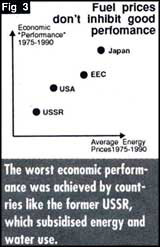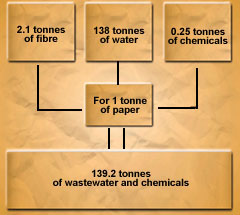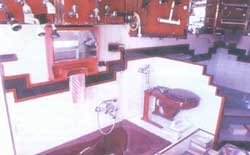
Green taxes won't leave taxpayer in the red
Environmental protection will work only if it makes economic sense. And, one good way of making sure it does is by introducing a comprehensive system of environmental taxes.

Environmental protection will work only if it makes economic sense. And, one good way of making sure it does is by introducing a comprehensive system of environmental taxes.

Developed nations are interpreting key clauses of the biodiversity treaty with the aim of protecting their own biotechnology industries from potential flak

Extensive soya bean cultivation in Madhya Pradesh to supply fodder to the West has cut a swathe of degradation

The Indian government will soo introduce measures to ease annual environmental statements to keep industry"s nose as clean as humanly possible

Researchers have come up with a promising invention to make solar power commercially viable

Three Leaves Company<br><br>SCORE 42.75%<br>RANK ONE

Irrespective of the costs incurred, corporate planning would do well to take into account the setting up of an effective pollution control mechanism
Children s toilets are a breed apart from the everyday adult toilet

Blames others for its failures. Is raring to destroy the CNG market by hiking prices

NATURE which inspires keen sentiments in many a poet and environmental activist, is now the subject of an annual report of the World Bank (WB) group. Reading the tedious report, one gets the

India was the first country in the world to make environmental audits mandatory, hoping it would encourage industry to shift from pollution control to process efficiency

Ludhiana will have to fight for its right to be clean
WOODY GOODY: It may not be real wood, but the success of the medium density fibre board (MDF) - manufactured under the brand name of NUWUD by Nuchem Limited in Tohana, Haryana--- means it has
yummy utensils: Instead of wiping their dishes and bowls clean, people can now munch and chew them up after meals. A Taiwanese inventor, Chen Liang has launched edible containers made of wheat

<b>Accountability in the Pesticide Industry A report based on a forum held at the Pocantico Conference Center</b> . June 25 28, 2002 . Paper No 5

How the West is trying to steal what is ours
Prasenjit Bose Since the Finance Minister would not have the opportunity to present a full Budget in 2009 because of impending Lok Sabha elections, Budget 2008-09 would be his last opportunity to fulfil the promises made in the National Common Minimum Programme (NCMP). The expenditure priorities have already been set forth by the Eleventh Plan. What is required is adequate budgetary support for the Plan, especially in priority areas like agriculture, PDS, education, health and employment generation. To meet the NCMP commitments, the gross budgetary support (GBS) for the Plan has to be stepped up. Budgets in 2006 and 2007 witnessed increases in GBS by around Rs 30,000 crore over previous years. It is evident that an increase of such magnitude, which amounts to less than 1% of current GDP, is inadequate for vital expenditure commitments. The increase in the GBS should be twice the amount seen in recent budgets. Agriculture, which was promised a new deal under the UPA, continues to languish. The advanced estimates for 2007-08 already show agricultural growth slipping to 2.6%, compared to 3.4% registered in 2006-07. To meet the Eleventh Plan target of 4% agriculture growth rate, the government needs to replace the half-hearted measures adopted so far with substantial allocations for debt relief, the Food Security Mission and Rashtriya Krishi Vikas Yojana. The rise in prices of essential commodities over the last two years has underlined the importance of strengthening the PDS. Domestic food production and public procurement also needs to increase to avoid the embarrassment of high-cost wheat imports. India should increase the food subsidy, which currently stands only at around 1% of GDP. It is also time to consider doing away with the targeted PDS, which has turned out to be a failure, and introduce a revamped, more efficient and universal PDS. The ban on futures trading of wheat, rice and some pulses imposed last year should continue for the sake of stability in food prices. Education and health have been accorded high priority under the Eleventh Plan. Expenditure on the former, up five-fold over the Tenth Plan, is aimed at building 6,000 schools, funding the Sarva Shiksha Abhiyan to ensure the Right to Education, building new ITIs and vocational training institutes to bridge the skill deficit, and setting up 30 new central universities along with new IITs, IIMs and IISERs to expand the country's knowledge base. These laudable objectives have to be backed up by adequate outlays. Outlays on the rural health mission and more Aiims-type institutions also have to be increased. The universalisation of the ICDS is being impeded by inadequate funding, which needs to be addressed. The NREGA, despite problems, has succeeded in providing work to 27.7 million people this year. No doubt, its implementation needs to be streamlined and the monitoring mechanism improved. However, this should not come in the way of expanding the employment guarantee to all rural districts and also to urban areas. This is the single biggest welfare measure adopted by the UPA government, and has offered relief to the poorest and most vulnerable. This safety net must be strengthened under all circumstances. The revenue buoyancy seen over the past few years should help mobilise resources for increased welfare expenditure and public investments. Efforts to widen the tax base should continue. The last Budget contained a study of corporate tax, which showed that the effective tax rate for Companies in 2006-07 was 19.2% against the scheduled tax rate of 33.6%. Tax concessions to corporate taxpayers increased from Rs 34,618 crore in 2005-06 to Rs 50,075 crore in 2006-07. Budget 2008-09 should take steps to bring down these tax expenditures. The burgeoning foreign exchange reserves built up on the basis of FII inflows have turned into a liability. Rupee appreciation is hurting export sectors and efforts to buy up foreign exchange followed by sterilisation are also leading to additional fiscal costs. Reintroduction of long-term capital gains tax and increasing the rate of the short-term capital gains tax and the STT would help stanch the inflow of speculative capital, curb equity market volatility and raise resources. Budget 2008 also offers the opportunity to initiate the long pending restructuring of the indirect tax structure on petroleum products
A state government survey says over 76 pc people had to grease the palms of municipal bodies to get basic amenities CHANDIGARH, February 21: It's not a finding the Punjab Government would like to flaunt. A survey sponsored by it has found out that 76.5 per cent of people pay bribes to officials in the various municipal bodies of the state to get their work done. The finding was an outcome of a study conducted by the Institute for Development and Communication (IDC) for the Department of Planning, Punjab Government. The study discovered that 76.5 per cent of the respondents had paid bribe on one occasion and most of them (82.3 per cent) had paid it to one person only. Interestingly, 94.1 per cent of the repondents admitted that the persons concerned had asked for money for redressal of their problems regarding basic amenities such as water, sewerage, streetlights and roads. Besides paying bribes, 37.1 per cent of the people also felt the need to approach an influential person to get their complaints redressed. Interestingly, almost half of the respondents were not in favour of paying bribes for any work at the MC level but were forced to do so. The only exception were people at Jalandhar and Nakodar where 80 per cent and 100 per cent of the respondents, respectively, did not mind greasing palms to get their work done at the municipal corporation. However, in many cases, bribe did not prove to be the ideal solution. Nearly 44.1 per cent of the respondents complained about harassment even after paying the bribe. Only 23.5 per cent felt that their work was done immediately after they paid the bribe, said the study. A large number (37.4 per cent) of respondents felt that middle-level officials were most corrupt, and only 8.1 per cent pointed a finger at the councillors. A majority of the complaints (45.2 per cent) were related to poor water supply followed by faulty streetlights, potholed roads (11.3 per cent) and choked sewerage (8.1 per cent). In Hoshiarpur, poor or polluted water supply accounted for half the complaints, while building construction made up for one-fourth of the grouses. In Moga and Amritsar, blockage of sewerage and poor water supply were the major grouses. In a damning indictment of the municipal bodies, the survey showed that 74.9 per cent of the people were dissatisfied with their grievance redressal system. The Jalandhar municipal body fared most poorly with only 2 per cent of the respondents saying that the civic body was prompt in dealing with grievances. The reasons for corruption, according to the study, ranged from poor work culture, faulty management, lack of proper planning, absence of transparency, to ad hoc allocation of resources. The people surveyed suggested transparency and involvement of the locals in grassroots initiatives would improve the delivery system. Principal Secretary, Local Bodies, DS Bains, however, blamed the old urban infrastructure for the corrupt system. "Urban infrastructure is nearing a collapse in the state for want of investment in the last decade and half. Some unscrupulous elements take advantage of people who want better services. The answer lies in massive investment to upgrade the urban services which we are doing this year.' Show 'em the money Of the 76.5 pc people who bribed Punjab civic body officials to get their work done:

The Calcutta tramcar system, perhaps the only eco friendly feature in the city's ruined landscape, is heading towards extinction

There are both in Delhi criminal waste, unendurable want. And in this city of verdant veneers, nowhere does the callous politics of dispossession show its slip more than in the titanic economics of water. Water led the way to the formation of cities; th